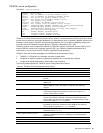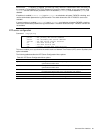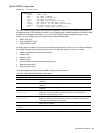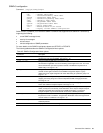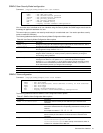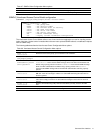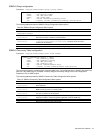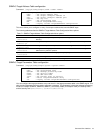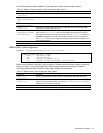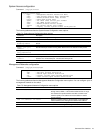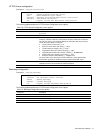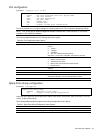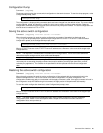
Command Line Interface 73
SNMPv3 Target Address Table configuration
Command: /cfg/sys/ssnmp/snmpv3/taddr <taddr number>
[SNMPv3 snmpTargetAddrTable 1 Menu]
name - Set target address name
addr - Set target transport address IP
port - Set target transport address port
taglist - Set tag list
pname - Set targetParams name
del - Delete targetAddrTable entry
cur - Display current targetAddrTable configuration
This menu allows you to configure an entry of a transport address that transmits SNMP traps.
The following table describes the SNMPv3 Target Address Table Configuration Menu options.
Table 71 SNMPv3 Target Address Table Configuration Menu options
Command Description
name <1-32
characters>
Configures the locally arbitrary, but unique identifier, target address name associated with
this entry.
addr <transport
address ip>
Configures a transport address IP that can be used in the generation of SNMP traps.
port <transport
address port>
Configures a transport address port that can be used in the generation of SNMP traps.
taglist <1-255
characters>
Configures a list of tags (up to 255 characters maximum) that are used to select target
addresses for a particular operation.
pname <1-32
characters>
Defines the name as defined in /cfg/sys/ssnmp/snmpv3/tparam/name.
del Deletes the Target Address Table entry.
cur Displays the current Target Address Table configuration.
SNMPv3 Target Parameters Table configuration
Command: /cfg/sys/ssnmp/snmpv3/tparam <tparam number>
[SNMPv3 snmpTargetParamsTable 1 Menu]
name - Set targetParams name
mpmodel - Set message processing model
model - Set security model
uname - Set USM user name
level - Set minimum level of security
del - Delete targetParamsTable entry
cur - Display current targetParamsTable configuration
You can configure the target parameters entry and store it in the target parameters table in the SNMP engine. This
table contains parameters that are used to generate a message. The parameters include the message processing
model (for example: SNMPv3, SNMPv2c, SNMPv1), the security model (for example: USM), the security name,
and the security level (noAuthnoPriv, authNoPriv, or authPriv).




